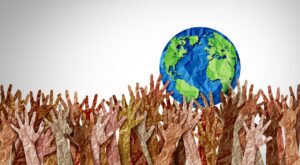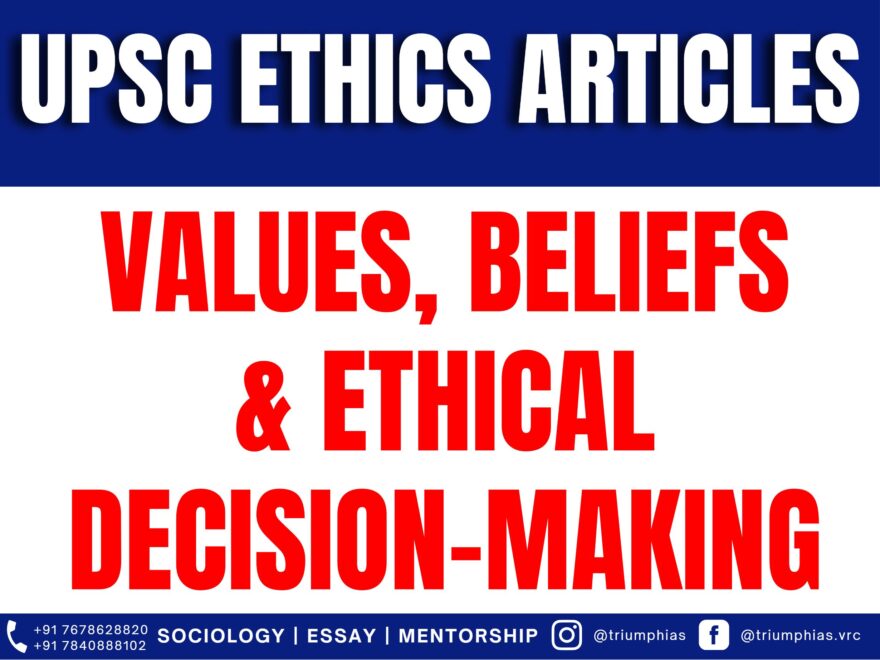Values and Beliefs
(Relevant for Ethics, Integrity and Aptitude)

Values and beliefs serve as guides for actions and behaviors, as well as shaping fundamental attitudes towards various aspects. Later in the discussion, we will delve into attitudes. The key distinction between these terms lies in the fact that beliefs are convictions, whereas values are ideas. Beliefs are convictions that we generally perceive to be true, often lacking concrete proof or evidence. On the other hand, values are enduring and stable beliefs about what holds significance to an individual. They serve as standards by which people organize their lives and influence decision-making processes.

Hence, values encompass beliefs that are more fundamental than other beliefs we might possess. They form the core of our belief systems and, consequently, shape our attitudes. Values pertain to how we should conduct ourselves and our perception of the desirability of specific outcomes. Moreover, the barriers and prevalent biases that impact our decision-making and lead to unethical outcomes are rooted in the type of value system we adhere to.

The pathway to achieving moral action can be broadly categorized into three elements:
- Moral awareness: This entails recognizing the ethical dilemmas at hand, identifying the involved parties, understanding the potential consequences, and exploring available courses of action.
- Moral judgment: This involves evaluating the ethical factors relevant to the situation and making a decision regarding the morally appropriate course of action.
- Implementation of moral judgment: It is not sufficient to simply determine the right course of action. One must also develop the intention to follow through with the morally sound decision and overcome practical obstacles to effectively act upon it.

Obstacles to Good Ethical Decision-Making
- Poor moral awareness can lead to two potential pitfalls. Firstly, it can result in a failure to recognize the issue as an ethical problem altogether, thereby bypassing the necessary steps of ethical decision-making. Alternatively, it can provide an agent with a distorted or incomplete understanding of the problem at hand. Therefore, when analyzing a situation in the context of ethical questions, it is crucial to be fully aware of all the elements, including underlying plots, sub-plots, stakeholders, explicit and implicit issues, and ethical dilemmas. Neglecting any of these aspects can lead to a flawed conceptualization of the entire problem.
- To overcome this obstacle, it is important to identify and address the barriers to moral awareness. One such barrier is the failure to gather relevant facts. Making sound practical decisions requires a comprehensive understanding of the pertinent information, including the potential impact on stakeholders. To address this, it is essential to invest sufficient time in gathering all the necessary facts before making a judgment. Rushing to conclusions without considering all the facts can compromise the decision-making process. Furthermore, considering the diverse interests of different stakeholders, it is crucial to critically evaluate the gathered facts to ensure they represent an unbiased representation of the situation.
- At the outset of the process, the exact facts or types of facts needed for a sound judgment may not be immediately clear. As one examines the situation from different stakeholder perspectives, the need for additional facts or clarification of existing facts is likely to arise.
To master these intricacies and fare well in the Sociology Optional Syllabus, aspiring sociologists might benefit from guidance by the Best Sociology Optional Teacher and participation in the Best Sociology Optional Coaching. These avenues provide comprehensive assistance, ensuring a solid understanding of sociology’s diverse methodologies and techniques.
Values, Beliefs, Ethics, Decision-Making, Moral Awareness, Moral Judgment, Ethical Dilemmas, Stakeholder Perspectives, Best Sociology Optional Teacher, Best Sociology Optional Coaching, Sociology Optional Syllabus

